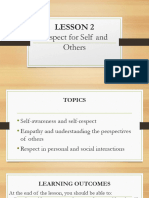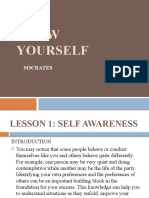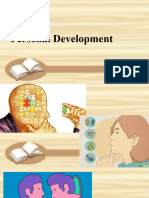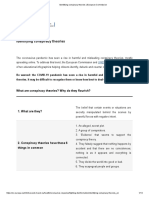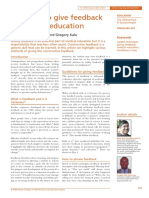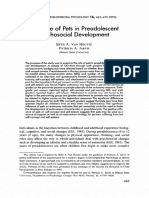Lecture Notes: Knowing Oneself
I. Introduction
Definition: Knowing oneself refers to the deep understanding of one's own identity,
beliefs, values, strengths, weaknesses, emotions, and motivations.
Importance:
o Foundation for personal growth and development.
o Enhances decision-making and life choices.
o Improves relationships and interactions with others.
o Key to achieving fulfillment and happiness.
II. The Layers of Self-Knowledge
1. Identity:
o Understanding who you are in terms of roles (e.g., student, friend, sibling),
culture, and personality traits.
o How identity shapes perceptions and interactions with the world.
2. Beliefs and Values:
o Core beliefs: Deeply held convictions about oneself and the world.
o Values: Principles and ideals that guide behavior and decisions.
3. Strengths and Weaknesses:
o Recognizing personal strengths that contribute to success and well-being.
o Identifying weaknesses as opportunities for growth and improvement.
4. Emotions and Emotional Intelligence:
o Awareness of emotional states, triggers, and responses.
o Developing emotional intelligence (EQ) for better self-management and
interpersonal relationships.
5. Motivations and Goals:
o Understanding what drives personal actions and ambitions.
o Setting meaningful goals aligned with personal values and aspirations.
III. Methods for Self-Discovery
1. Self-Reflection:
o Engaging in introspection to explore thoughts, feelings, and experiences.
o Journaling or writing exercises to capture insights and reflections.
2. Feedback and Perspective:
o Seeking feedback from others to gain insights into how you are perceived.
o Being open to different viewpoints and interpretations of your actions.
3. Psychological Assessments:
� o Using tools such as personality tests or assessments to gain deeper insights into
traits and behaviors.
4. Mindfulness and Meditation:
o Practicing mindfulness to cultivate present-moment awareness.
o Meditation techniques to quiet the mind and enhance self-awareness.
IV. Benefits of Knowing Oneself
Authenticity: Being true to oneself and living in alignment with personal values.
Confidence: Greater self-assurance in decision-making and actions.
Resilience: Better equipped to handle challenges and setbacks.
Empathy and Compassion: Understanding oneself enhances empathy towards others.
V. Challenges in Knowing Oneself
Bias and Blind Spots: Overestimating or underestimating one's abilities or behaviors.
Fear of Self-Reflection: Avoiding uncomfortable truths about oneself.
Changing Self-Perceptions: Growth and experiences can alter self-perception over time.
VI. Application of Self-Knowledge
Personal Growth: Using self-awareness to set and achieve personal development goals.
Career Development: Aligning career choices and paths with strengths and passions.
Relationships: Building healthier and more meaningful connections with others.
VII. Conclusion
Knowing oneself is a lifelong journey of self-discovery and personal understanding.
Encourage ongoing self-reflection and exploration for continuous growth.
Emphasize the importance of self-awareness in achieving personal and professional
fulfillment.

































